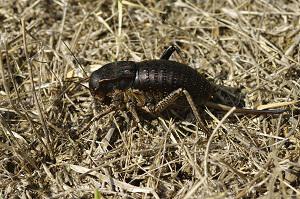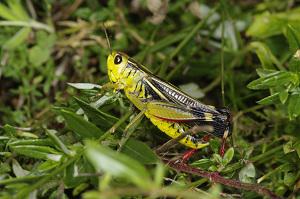Slobodan Ivkovic
Other projects
The aim of this project is to study the presence, abundance and population status of Bradyporus dasypus, Callimenus macrogaster and Saga natoliae in southern Serbia , and to raise environmental awareness among the local community about these insects and their importance.

Bradyporus dasypus.
Steppe habitats are one of the most vulnerable habitats in Europe . In Serbia , poor economic conditions have placed additional pressure on remaining steppe habitats, leading to their conversion into agricultural land. Unfortunately, environmental protection of the steppe has not been a priority of government institutions in Serbia , mostly because of a lack of scientific data. In this project, we focus on endemic taxa which could motivate the public to support protection of steppe habitats.

Arcyptera fusca.
Orthoptera, as one of the most sensitive elements in the steppe, are suitable umbrella species. Because they are the largest and most attractive bushcrickets in Europe , endemic Balkan species such as Bradyporus dasypus, Callimenus macrogaster and Saga natoliae, may be ideal standard bearers for efforts to protect steppe habitats. In addition, Bradyporus dasypus and Callimenus macrogaster are under threat of extinction. Although once widely distributed in southern Serbia , today these two species are absent from previously known localities. Recent findings confirm their presence in the extreme south of Serbia, where the largest area of preserved native steppe habitat remains. However, a solar power plant project planned for 2013 represents a serious threat to their survival.
The results of this research should provide a basis for the creation of best management strategies for the steppe habitats that these species utilise, thus increasing their chances for survival. In addition, this region of Serbia is under-investigated, and this project will provide a more complete view of the local Orthoptera fauna, in terms of biodiversity and vulnerability. Moreover, raising environmental awareness among the local population, through lectures, pamphlets and posters about these unique and rare animals and their environment, is a necessary step toward encouraging their protection and preservation.